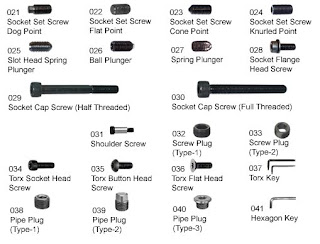Iron (Fe) : 20 Baht : kg
Aluminium (Al) : 70 Baht : kg
Stainless : 100 Baht : kg
Brass (Cu+Zn) : Green Brass 160 Baht : kg
Red Brass 180 Baht : kg (more Cu)
Copper(Cu) : 230 Baht : kg
*This data can be varied at most +,- 20 Baht/kg (research from a small industry.)
Ps. You can see these materials' pictures and details at Chai & Golf 's research.
วันพฤหัสบดีที่ 9 สิงหาคม พ.ศ. 2550
Additional
Nyloc nuts (or lock nuts) -->Are a kind of nut that includes a ring of nylon inside the thread. They are designed to increase locking force and prevent the nut from coming loose. The internal nylon ring has no threads cut into it; it is forced to deform around the threads as the nut is twisted on, ensuring a tight grip on the thread. In most applications, this type of nut cannot be reused after being removed.
------------------------------------------------------------------------------------------------

Jam nut --> inserting smaller nut first then followed by bigger nut for being more fasten, This method is called 'Jam nut'.
------------------------------------------------------------------------------------------------

Jam nut --> inserting smaller nut first then followed by bigger nut for being more fasten, This method is called 'Jam nut'.
Nut
Screw
For my research topic is just screws, but bolts are important to know, because it is concern in the system.
Differentiation between bolt and screw
A screw, by definition, is not a bolt. A bolt passes through a hole of larger diameter than its thread, and is held in place by a nut or similar device; it is not designed to be turned. What is often referred to as a bolt is in fact a 'cap screw', which is designed to be turned (or screwed). Cap screws may, or may not be used with nuts. The distinction is subtle, but significant in the design of the fastener. If threaded all the way to the back of the head a cap screw become a 'machine screw'.
Differentiation between bolt and screw
A screw, by definition, is not a bolt. A bolt passes through a hole of larger diameter than its thread, and is held in place by a nut or similar device; it is not designed to be turned. What is often referred to as a bolt is in fact a 'cap screw', which is designed to be turned (or screwed). Cap screws may, or may not be used with nuts. The distinction is subtle, but significant in the design of the fastener. If threaded all the way to the back of the head a cap screw become a 'machine screw'.
Ex.for making washer by yourself.
วันจันทร์ที่ 6 สิงหาคม พ.ศ. 2550
วันอาทิตย์ที่ 5 สิงหาคม พ.ศ. 2550
meaning of washer
Washer - in this blog is not washching-machine, it is a thin plate (typically disk-shaped) with a hole (typically in the middle) that is normally used to distribute the load of a threaded fastener. Other uses are as a spacer,wear pad, preload indicating device, and locking device.It could be made of various materials. It usually made of metal because it is the most strength, to prevent the loss of pre-load. Another washer is rubber or fiber glass ever use in tap to stop the flow of liquid or gas. ** Usually washer have outer diameter about twice their inside diameter.
สมัครสมาชิก:
ความคิดเห็น (Atom)

















